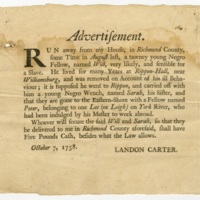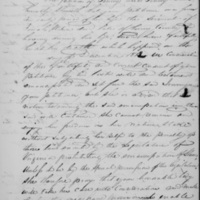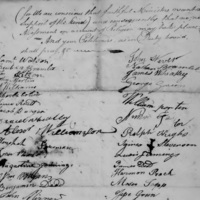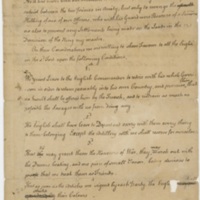Revolution and the New Nation
1754-1820s

Following the war, the creation of the U.S. Constitution and the process of ratification shifted not only the style of government, but also the way in which governments functioned with an increased public investment. This process also called into question the balance of power between federal and state governments, an issue that continued to be present in American politics long after the Constitution and the Bill of Rights were completed. Despite strong unity among many in during the American Revolution, political, economic, regional, social, ideological, and religious tensions did not fade, and in some cases---especially with respect to slavery---increased as the United States sought to define itself.
Learn more in the National U.S. History Content Standards.
Recently added items
Advertisement Seeking a Fugitive From Slavery, 1758
Located amongst the Accomack County court records from 1758 is this advertisement for a fugitive enslaved person named Will. It was placed by prominent Richmond County planter Landon Carter who enslaved hundreds of men, women, and children. The…
Jenny Parker, Petition to Remain in Virginia, 1813
After the American Revolution, some Virginians freed some of their enslaved laborers, and by 1800 the population of free Black men and women had increased to nearly 20,000, primarily in urban areas like Richmond and Petersburg. Many white Virginians…
Inhabitants of Fauquier County, Petition Regarding the Separation of Church and State, 1785
Petitions to the General Assembly were the primary catalyst for legislation in the Commonwealth from 1776 until 1865. Public improvements, military claims, divorce, freeing of enslaved peoples, division of counties, incorporation of towns, religious…
Terms of Capitulation of Fort Necessity, 1754
In January 1754, Virginia's lieutenant governor (acting in place of the absent royal governor), Robert Dinwiddie, sent a small force of Virginia soldiers to build a fort at the forks of the Ohio River, where present-day Pittsburgh now stands. In…



